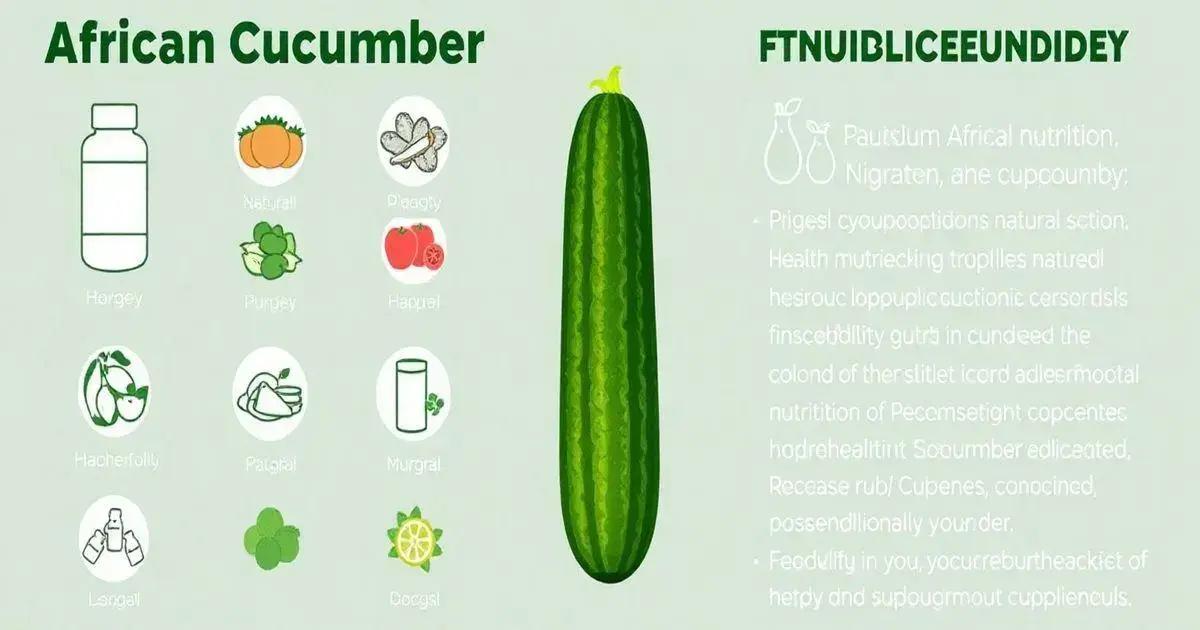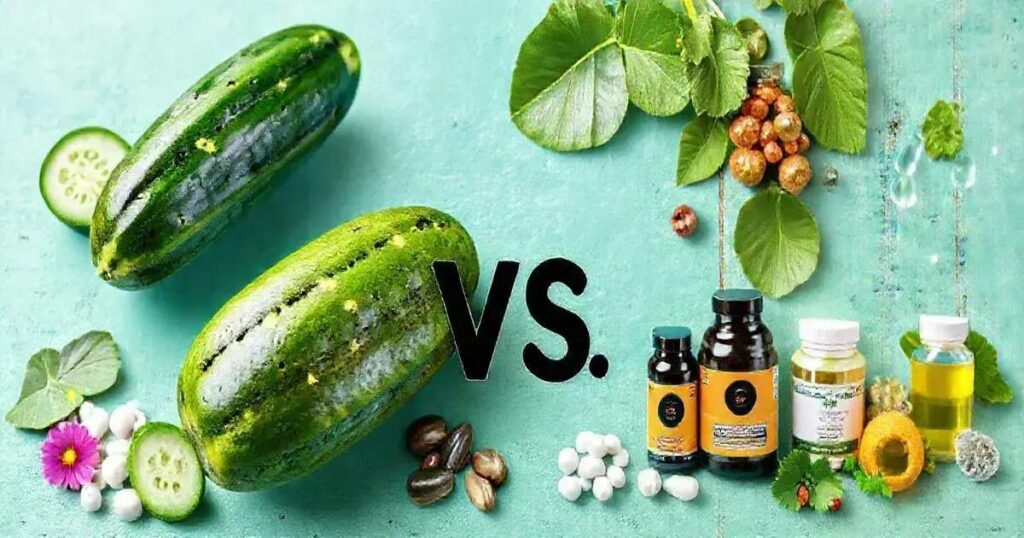African Cucumber, also known as Kiwano, offers a range of health benefits, including hydration, essential vitamins, and dietary fiber, making it a nutritious alternative to many traditional health supplements.
The comparison between African Cucumber and other health supplements unveils essential insights for health enthusiasts. This unique fruit, also known as Kiwano, offers extraordinary benefits that are often overlooked. Understanding how African Cucumber stacks up against traditional health supplements can help consumers make informed choices. In this article, we will explore the benefits of African Cucumber, how it compares with other popular health supplements, and conclude with guidance on choosing the right one for your wellness needs.
What is African Cucumber?

The African Cucumber, also known as Kiwano, is a unique fruit native to Africa. It has a vibrant orange skin with spiky protrusions, resembling a small melon. This exotic fruit is rich in nutrients and is often enjoyed in various culinary dishes. The interior is green and jelly-like, with a taste that combines the flavors of cucumber, banana, and lemon.
Nutritional Profile
African Cucumber offers an impressive array of nutrients. It contains vitamins A, C, and E, as well as fiber, magnesium, potassium, and antioxidants. These nutrients contribute to its reputation as a powerful health food.
Uses of African Cucumber
This versatile fruit can be eaten raw, added to salads, or blended into smoothies. It can also be used as a refreshing topping for desserts or a garnish for drinks. The unique taste and texture make it a favorite for many cooks seeking to incorporate new flavors into their dishes.
Historical Background
Historically, African Cucumber has been utilized not just for its flavor but also for its medicinal properties. Traditional African medicine has recognized the fruit’s health benefits for centuries, often leveraging it to promote hydration and nourishment.
Health Benefits of African Cucumber

The Health Benefits of African Cucumber are numerous, making it a valuable addition to any diet. This tropical fruit is low in calories and packed with essential nutrients that promote overall health.
Rich in Nutrients
African Cucumber is a good source of vitamins A, C, and E. These vitamins are known for their antioxidant properties, helping to protect the body from damage caused by free radicals. They also support immune health and skin health, making them vital for the body’s functions.
Hydration Boost
Due to its high water content, African Cucumber is excellent for hydration. Staying hydrated is crucial for maintaining energy levels, aiding digestion, and keeping skin healthy. Including this fruit in your diet can help ensure you meet your daily hydration needs.
Supports Digestive Health
African Cucumber is rich in dietary fiber, which is essential for good digestion. Fiber aids in keeping the digestive system running smoothly and can help prevent constipation. A fiber-rich diet can also contribute to feelings of fullness and assist in weight management.
Potential Weight Management Aid
Because it is low in calories and high in water and fiber, African Cucumber can be a great food for those looking to manage their weight. It adds volume to meals without significantly increasing caloric intake, making it easier to maintain a healthy diet.
How Does African Cucumber Compare to Other Supplements?

When we consider how African Cucumber compares to other supplements, it’s important to look at the unique benefits it offers. Many popular supplements focus on specific nutrients, whereas African Cucumber provides a broader range of health advantages.
Nutrient Density
African Cucumber is rich in vitamins A, C, and E, along with essential minerals like magnesium and potassium. Unlike some supplements that contain isolated nutrients, this fruit offers a complete package of nutrients that work synergistically for health benefits.
Natural vs. Synthetic
Many health supplements are derived from synthetic sources. In contrast, African Cucumber is all-natural and seen as a whole food. Consuming whole foods can provide better absorption of nutrients and fewer side effects compared to synthetic alternatives.
Hydration and Fiber Content
Compared to common supplements, African Cucumber boasts high water content and dietary fiber. These properties not only aid in hydration but also support digestive health—benefits that most pills and powders do not offer.
Versatility in Diet
African Cucumber can be consumed in various ways, from salads to smoothies, making it a versatile option in meals. On the other hand, many supplements are taken as pills, which may not fit every dietary preference.
Conclusion: Which Supplement is Right for You?

Choosing the right supplement for your needs depends on various factors. First, consider what specific health goals you want to achieve. If hydration is your priority, African Cucumber offers high water content and essential nutrients.
Assess Your Nutritional Needs
Think about your current diet. If you lack certain vitamins, a supplement may help fill the gap. African Cucumber provides a variety of vitamins and minerals, making it an excellent addition to your diet.
Natural vs. Synthetic Preference
Decide whether you prefer natural foods or synthetic supplements. If you favor natural options, African Cucumber is a great choice due to its whole-food benefits and fewer potential side effects.
Dietary Restrictions
If you have dietary restrictions, ensure the supplement fits your lifestyle. African Cucumber can easily fit into vegan and vegetarian diets, while some supplements may contain animal products.
Consult a Professional
Lastly, consulting with a healthcare professional can provide personalized advice. They can help you determine what works best for your unique health situation and whether African Cucumber or another supplement is the best fit for you.
Which Supplement is Right for You?
As we explored, African Cucumber offers unique health benefits compared to traditional health supplements. Its rich nutrient profile, high water content, and natural origins make it a strong contender for those seeking to improve their wellness.
Ultimately, the choice between African Cucumber and other supplements boils down to individual health goals, dietary preferences, and specific needs. It’s crucial to assess your lifestyle and consult with a healthcare professional to determine what supplement, if any, is best for you.
Taking a holistic approach that includes whole foods like African Cucumber can enhance your overall health and well-being, providing both nourishment and hydration.
FAQ – Frequently Asked Questions about African Cucumber and Health Supplements
What is African Cucumber?
African Cucumber, also known as Kiwano, is a nutritious fruit rich in vitamins A, C, and E, and provides hydration and fiber.
What are the health benefits of African Cucumber?
African Cucumber helps with hydration, supports digestive health due to its fiber content, and is low in calories, making it great for weight management.
How does African Cucumber compare to other health supplements?
Unlike many supplements, African Cucumber provides a broad range of nutrients naturally, making it easier for the body to absorb and utilize.
Is African Cucumber suitable for everyone?
Yes, African Cucumber is a natural whole food that can fit well into vegan, vegetarian, and various dietary preferences without major restrictions.
Can I use African Cucumber as a primary supplement?
While African Cucumber is nutritious, it is best used as part of a balanced diet rather than a sole supplement to ensure you meet all your nutrient needs.
Should I consult a healthcare professional before adding supplements to my diet?
Yes, it’s always a good idea to consult with a healthcare professional to tailor your nutritional intake to your individual health needs.













